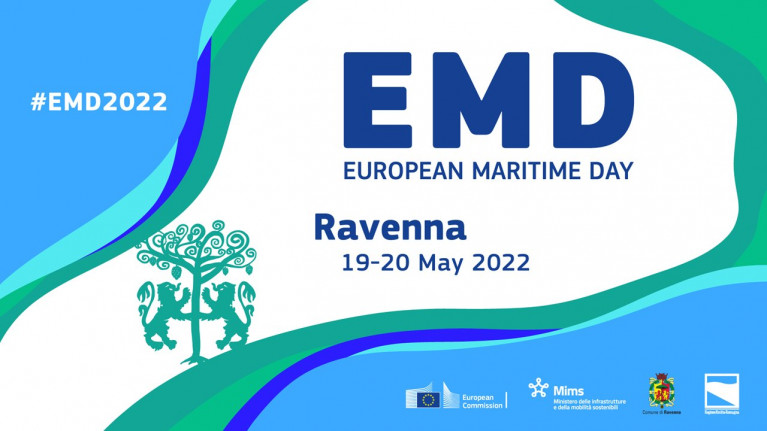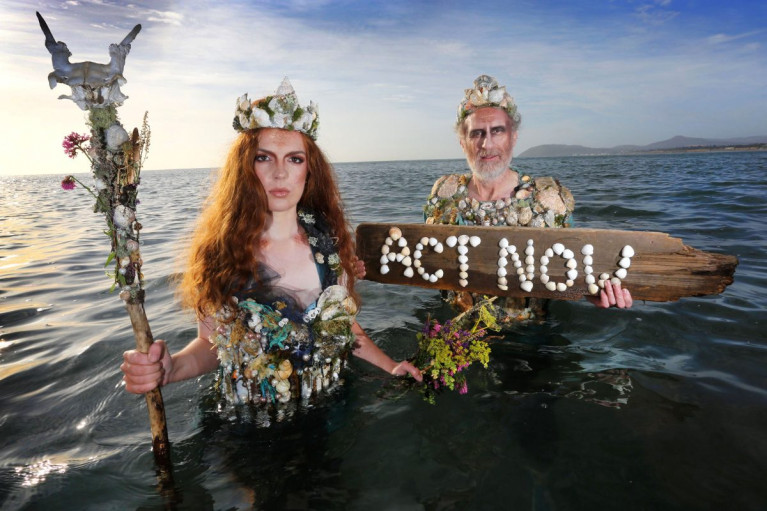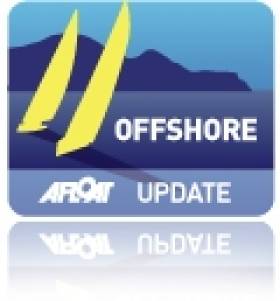Displaying items by tag: Oceans
European Maritime Day (EMD) Conference Underway in Addition to Events throughout the Continent
The European Maritime Day (EMD) the annual two-day (19-20 May) event takes place in Ravenna, Italy during which Europe’s maritime community meet to network, discuss and outline joint action on maritime affairs and sustainable blue economy.
EMD is the place where ‘Ocean Leaders Meet’. It provides an engaging and complete interactive experience to catch up on the current state of play on a broad range of issues concerning the blue economy and the marine environment and discuss ways of moving forward. It features a large number of excellent speakers, thematic sessions, stakeholder workshops and project pitch sessions organised by stakeholders and the European Commission as well as hundreds of B2B meeting opportunities. EMD targets professionals from businesses, governments, public institutions, NGOs and academia.
The 2022 edition of European Maritime Day is a hybrid event for 750 physical participants. This year’s main theme is ‘Sustainable blue economy for green recovery’.
All the sessions will be organised in a physical format, with speakers and moderators in the venue. In parallel, all the sessions (plenaries, workshops, pitch stage sessions) will be available for remote participants via webstreaming or ZOOM.
EMD 2022 will also host the EU4Ocean Summit (on day 2 – 20 May), focusing on Ocean and Climate, Food from the Ocean and Healthy and Clean Oceans. (See, related Marine Institute's celebratration of Marine Research Vessels and Ocean Explorers – Our Past, Present and Future).
The EMD is co-organised by the European Commission, the City of Ravenna, the Ministry of Sustainable Infrastructures and Sustainable Mobility and the Region of Emilia-Romagna.
In parallel with EMD Conference in Ravenna, there will be plenty of 'EMD In My Country 2022' events taking place all over Europe from April to October 2022.
Oceans: Warmest Temperature Recorded in 2019
The warmest year for the ocean in all of human history took place last year, according to a new study.
According to GreenNews.ie, research from the Institute of Atmospheric Physics also found that the past five years produced the warmest ocean temperatures on record.
The Atlantic Ocean has absorbed a large amount of heat, while the Southern Ocean that encircles Antarctica has taken up “most of the global warming heat” since 1970, the study finds.
Marine heatwave events were also found in the Mediterranean Sea and continue to pose a significant risk to marine biodiversity and fisheries, the study adds.
For further reading click this link.
Three Boats arrive in Punta del Este within 80 minutes
After nearly four weeks at sea and more than 6,700 miles of racing through the Southern Ocean and the South Atlantic from New Zealand to Uruguay, the fight for second place came down to a nail-biting drag race to the finish line.
As a flotilla of boats took to the waters off Punta del Este to witness the finale and welcome in the skippers they were greeted by two unmistakable shapes on the horizon – Operon Racing and Spartan neck and neck, separated by less than a mile. With around a mile to the finish line it was CSM who had the slight advantage but after taking a course too close to the shore he was forced to gybe twice to lay the line, allowing Gutek to capitalise.
In an amazing photo finish it was Gutek who emerged the victor, sneaking in front of CSM right at the last moment to clinch second place by less than a minute. Gutek crossed the finish line at 4.40pm local time (1840 UTC) after 25 days, 17 hours and ten minutes. Forty seconds later, CSM crossed.
And in an exhilarating conclusion to the leg, Canadian Derek Hatfield blasted across the line just over an hour later after 25 days, 18 hours and 22 minutes. Following Brad Van Liew's win on Tuesday afternoon, all four boats arrived in just over 48 hours of each other.
"It was a fight to the end and I won," Gutek said after stepping on to the dockside to rapturous applause from the waiting crowds. "This second place is the best of all of them, much better than in Wellington and Cape Town. I am really proud."
Moments later it was CSM's turn to join his fellow skippers on dry land. "This sprint has proven I have a fast boat and I have taken the handbrake off now and I think we have a good chance for the next leg," he said. "We have lost out on second place and that's a great pity, I wish we were parked one boat closer to Brad, but I think we have made our point – we know what we're doing now and we can go fast."
"Never in a 6,000-mile leg have I seen a finish this close," Derek added. "It was incredible. All I can say is wow, what a race. It was so close, I loved it."
Ocean sprint three has by no means been easy going for any of the VELUX 5 OCEANS skippers. In the middle of the Southern Ocean, thousands of miles from anywhere, CSM's mainsail ripped and he was forced to spend 30 hours stitching it in horrendous weather conditions. He also had to contend with rips in one of his foresails as well as a major water leak onboard Spartan.
Gutek faced a nervous rounding of the mighty Cape Horn when keel problems developed onboard Operon Racing. After a composite part on the yacht's keel pins broke, the keel started to move several millimetres, making a dull knocking sound. Gutek was forced to fully cant the keel for the remainder of the race, affecting his performance.
Onboard Active House Derek was dealing with an engine oil leak which meant he could only charge his batteries when on port tack. After holding on to second place until just two days from Punta del Este, it was low power to his wind instruments that was Derek's eventual downfall.
"The results of this leg really bode well for the future of the Eco 60 class," Derek concluded. "Here we have recycled older boats that are so competitive and level – it makes for great racing."
Ocean sprint four will see the fleet sprint 5,800 nautical miles to Charleston, starting on March 27.
FINAL POSITIONS:
1st Brad Van Liew - 23 days, 17 hours and 46 minutes
2nd Zbigniew Gutkowski - 25 days, 17 hours and 10 minutes
3rd Chris Stanmore-Major - 25 days, 17 hours and 10 minutes 40 seconds
4th Derek Hatfield - 25 days, 18 hours and 22 minutes.
SKIPPER QUOTES:
Gutek: "The end to my sprint three story is amazing. This second is the best of all of them, much better than in Wellington and Cape Town. I am really proud. For the last 48 hours I worked so hard to get every last bit of speed out of my boat. Six miles from the finish I was leading Chris, and then more wind came and he went past me. I hoisted my gennaker and we were neck and neck. It was a fight to the end and I won."
CSM: "It's been a very interesting day. This morning I got a position update saying Gutek was only one mile behind me. I was hoping that the tack I was about to do would put me ahead of him but I saw him about 11am pass in front of me about a mile ahead. He is sailing that boat out of his skin. I just couldn't catch him going upwind. Then the wind clocked round so we were on a reach and that's what Spartan does best. Suddenly we were doing 13 or 14 knots and we chased Gutek down pretty quickly. Coming into Punta I had about a fix-boat lead on him and everything was looking really good. Then, coming towards the line I got too close to a patch of rocks which was an error on my part. I had been on deck concentrating on the sailing. I had to put two gybes in to get to the finish line and that allowed Gutek to pass me in the dying moments. I ended up finishing 40 seconds behind him rather than 40 seconds ahead, but that's racing, that's what it's all about. This sprint has proven I have a fast boat and I have taken the handbrake off now and I think we have a good chance for the next leg. We have lost out on second place and that's a great pity, I wish we were parked one boat closer to Brad, but I think we have made our point – we know what we're doing now and we can go fast."
Derek: "All I can say is 'wow, what a race'. It was so close, I loved it. It was a lot of work but not as much effort as sprint two. It was a good leg, a fun leg. We had a really fast passage to Cape Horn and then an amazing rounding of the Horn within a mile of the coast. The second part from Cape Horn, the last 1,000 miles, was the most difficult part. Not that long ago I was in second place but all I can say is in the last few days the wheels really fell off. Because of the oil leak in my engine my power got so low that my wind instruments wouldn't work. In the dark I was going back and forth trying to get upwind, and that's when Gutek got away. It was mine to lose. The results of this leg really bode well for the future of the Eco 60 class – here we have recycled older boats that are so competitive and so level. It makes for great racing. Never in a 6,000-mile leg have I seen a finish this close, it was incredible."






























































